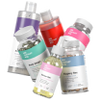Hormones—we hear about them all the time. They play a role in mood shifts throughout the month, and they influence much more than that. Hormonal changes are a natural part of life and can also affect intimate comfort. Understanding the connection between hormones and dryness can help you make thoughtful choices for everyday care.
Understanding Hormonal Fluctuations
Hormonal fluctuations are the natural rise and fall of hormone levels over time—during puberty, the menstrual cycle, pregnancy, and menopause. Because hormones help regulate many body functions, shifts can influence how skin and delicate areas feel day to day.
The Role of Estrogen in Intimate Comfort
Estrogen helps support moisture, elasticity, and overall comfort in intimate tissues. When estrogen levels dip, some people notice increased dryness or sensitivity. If discomfort is persistent or concerning, it’s a good idea to check in with a healthcare professional. “Factors associated with developing vaginal dryness symptoms in women transitioning through menopause: a longitudinal study”
Common Triggers Linked to Dryness
- Menopause and perimenopause: Natural hormone changes can influence moisture and comfort.
- Postpartum changes: After childbirth (and while breastfeeding), shifts in hormones may be noticeable.
- Birth control or hormone therapy: Some options may feel different from person to person.
- Stress: Ongoing stress can affect overall balance and well-being.
- Health considerations: Conditions like PCOS or thyroid concerns can be associated with changes; speak with your clinician for guidance.
- Some medications: Certain allergy, mood, or cancer treatments may be associated with dryness sensations.
What It May Feel Like
People describe dryness in different ways—such as sensitivity, irritation, or general discomfort. If these concerns affect daily life or intimacy, consider discussing options with your healthcare provider. Cleveland Clinic discussion
Supportive Approaches for Everyday Care
- Lifestyle foundations: Balanced meals, movement, sleep, and stress management can support overall well-being.
- Botanical routines: Some people explore botanicals in their self-care. If you’re curious about slippery elm as part of a hydration-support routine, you can learn more here: Slippery Box.
- Moisturizers and oils (external use): Gentle oils can soften and condition external skin. Explore our lightweight option: Yoni Oil.
- Gentle cleansing: Choose mild, plant-based washes for external cleansing. A fan favorite for everyday use is Yummy Vegan Body Wash.
Daily Tips
- Hydration: Drinking water throughout the day supports general wellness.
- Comfort-first wardrobe: Breathable, cotton underwear and avoiding irritating products can help keep delicate areas comfortable.
- Regular check-ins: Routine visits with a clinician can help you personalize your plan.
Real Reviews, Real Customers
When to Seek Medical Guidance
If dryness or discomfort is persistent, severe, or comes with other symptoms, consult a qualified healthcare professional to rule out underlying causes and discuss options that fit your needs.
References
- Abraham, Cynthia. “Experiencing Vaginal Dryness? Here’s What You Need to Know.” ACOG. Link
- “Factors associated with developing vaginal dryness symptoms in women transitioning through menopause: a longitudinal study.” NCBI. Link
- Youssef, Nada. “Women’s Health: PCOS, Endometriosis and Periods with Dr. Linda Bradley.” Cleveland Clinic. Link
Content is for general information only and not a substitute for professional medical advice. Products are intended for cosmetic/self-care use and are not intended to diagnose, treat, cure, or prevent any disease. External products are for external use only. Individual experiences vary.







